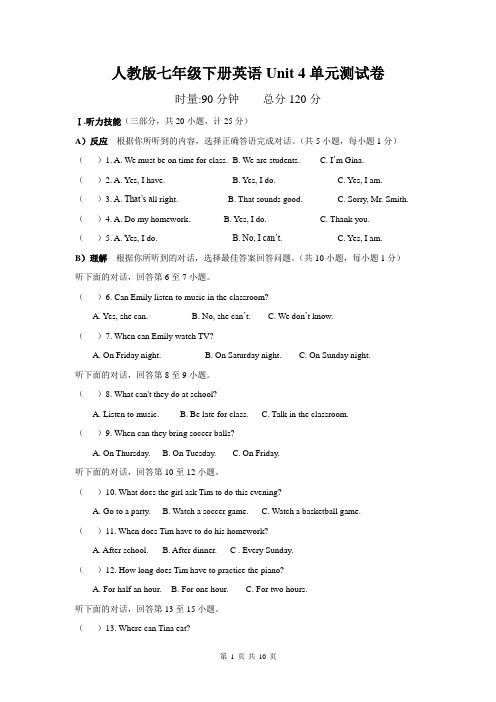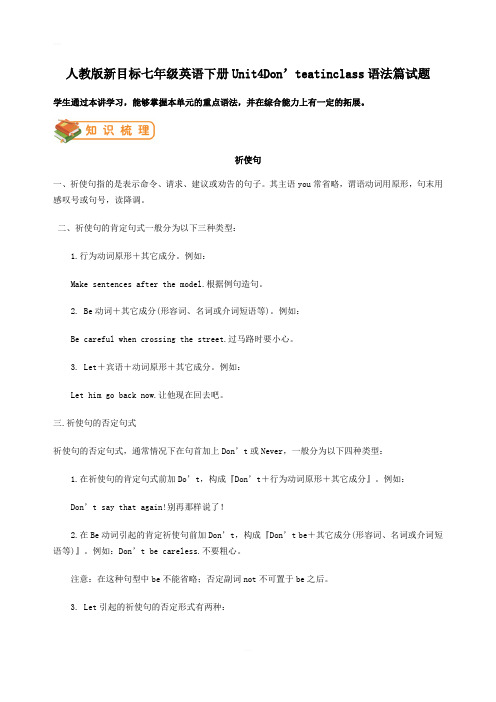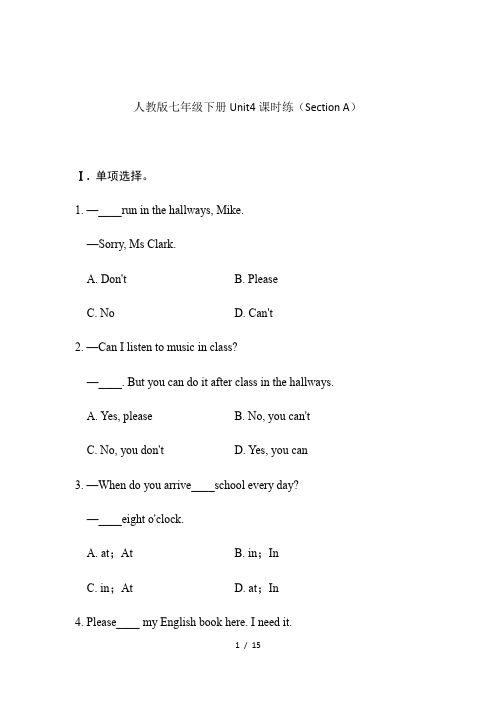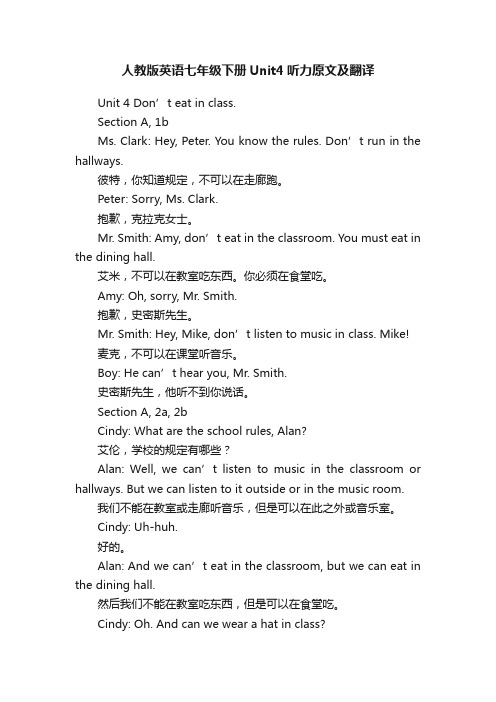unit4 don't run in the hallways Section A 1
人教版七年级下册英语 Unit 4 单元测试卷(含答案+听力材料)

人教版七年级下册英语Unit 4单元测试卷时量:90分钟总分120分Ⅰ.听力技能(三部分,共20小题,计25分)A)反应根据你所听到的内容,选择正确答语完成对话。
(共5小题,每小题1分)()1. A. We must be on time for class. B. We are students. C. I’m Gina.()2. A. Yes, I have. B. Yes, I do. C. Yes, I am.()3. A. That’s a ll right. B. That sounds good. C. Sorry, Mr. Smith. ()4. A. Do my homework. B. Yes, I do. C. Thank you.()5. A. Yes, I do. B. No, I can’t. C. Yes, I am.B)理解根据你所听到的对话,选择最佳答案回答问题。
(共10小题,每小题1分)听下面的对话,回答第6至7小题。
()6. Can Emily listen to music in the classroom?A. Yes, she can.B. No, she can’t.C. We don’t know.()7. When can Emily watch TV?A. On Friday night.B. On Saturday night.C. On Sunday night.听下面的对话,回答第8至9小题。
()8. What can't they do at school?A. Listen to music.B. Be late for class.C. Talk in the classroom.()9. When can they bring soccer balls?A. On Thursday.B. On Tuesday.C. On Friday.听下面的对话,回答第10至12小题。
人教版新目标七年级英语下册Unit4Don’teatinclass语法篇试题含答案

人教版新目标七年级英语下册Unit4Don’teatinclass语法篇试题学生通过本讲学习,能够掌握本单元的重点语法,并在综合能力上有一定的拓展。
祈使句一、祈使句指的是表示命令、请求、建议或劝告的句子。
其主语you常省略,谓语动词用原形,句末用感叹号或句号,读降调。
二、祈使句的肯定句式一般分为以下三种类型:1.行为动词原形+其它成分。
例如:Make sentences after the model.根据例句造句。
2. Be动词+其它成分(形容词、名词或介词短语等)。
例如:Be careful when crossing the street.过马路时要小心。
3. Let+宾语+动词原形+其它成分。
例如:Let him go back now.让他现在回去吧。
三.祈使句的否定句式祈使句的否定句式,通常情况下在句首加上Don’t或Never,一般分为以下四种类型:1.在祈使句的肯定句式前加Do’t,构成『Don’t+行为动词原形+其它成分』。
例如:Don’t say that again!别再那样说了!2.在Be动词引起的肯定祈使句前加Do n’t,构成『Don’t be+其它成分(形容词、名词或介词短语等)』。
例如:Don’t be careless.不要粗心。
注意:在这种句型中be不能省略;否定副词not不可置于be之后。
3. Let引起的祈使句的否定形式有两种:(1)Let开头的祈使句,如果后面跟第一、第三人称名词或代词的宾格,可在Let前加Don’t,也可在Let后宾格的名词或代词后面加not。
(2)如果以Let’s开头的祈使句,必须在Let’s后加not。
例如:Don’t let me go with her tom orrow. =Let me not go with her tomorrow.不要让我明天跟她一起去。
Let’s not tell her the truth whenever we meet her.无论什么时候我们碰到她,都不要告诉她真相。
新版(人教版)七年级(下)英语Unit4课文详解

Unit 4 Don’t eat in class.Section A 2a—2d ( P20 )* 教师寄语:No rules, no standards. 没有规矩,不成方圆。
【学习目标】【学习重点】:1、学习掌握本节课的生词和短语;2、巩固祈使句的用法;3、学习情态动词can表示许可的肯定句、否定句、一般疑问句及肯定、否定回答。
4、提高学生的听说能力。
【体验学习】:I、预习交流1. 根据音标拼读单词并牢记;2. 自学课文,勾画出重点和疑惑。
II、翻译官1. eat outside ________________2. wear a hat ___________________3. a lot of ___________________4. be late for class_______________5. 不得不__________________6. 穿校服_____________________7. 保持安静________________【课堂导学】:I、新课呈现Step1 RevisionReview the school rules at P19.Step2 PresentationPresent key sentences in this period.This is a great school, but there are a lot of rules.Can we bring music players to school?And we always have to wear the school uniform.And we also have to be quiet in the library.Step3 ListeningListen and finish 2a and 2b. Check the answers.Step4 Pair workTalk about the rules in 2a.Step5 Role-playRole-play the conversation in 2d.II、合作交流Group work: 分析总结情态动词can的用法,并练习造句。
人教版英语七年级下册-Unit-4-Don't-eat-in-class-语法解析

2021/2/4
1
6
疑问句: must 提前,回答时注意一二人称的互换。肯定用 must, 否定用needn’t. e.g. --Must I go home now?
-- Yes, you must. -- No, you needn’t.
B: And I must clean my room every Saturday. =?
A: Wow, you do have a lot of rules!
2021Dr. Know, There are too many rules! At 6:00 a.m. my mom says, “Get up now and make your bed!”
too many rules “太多的规定”, 其中too many 用来 修饰可数名词复数rules。 e.g. He has too many friends to meet.
修饰不可数名词时, 要用too much e.g. We have too much work to do.
much too 太……much 用来增强语气。后接形容 词或副词。
What can I do. Dr. Know? Molly Brown, New York
表“看”的单词?
either 也。用于否定句和疑问句中。肯定句中用too 表也。
watch,see,look r,read
2021/2/4
1
13
Dear Molly, I know how you feel. People always tell us, “ Don’t do this!” or “You can’t do that!” But think about it, Molly. There are a lot of things you can do. You can play basketball on weekends. You can watch TV after you read a book. Parents and schools are sometimes strict,
2020年人教版七年级英语下册Unit4课时练(SectionA)(有答案)

人教版七年级下册Unit4课时练(Section A)Ⅰ. 单项选择。
1. —____run in the hallways, Mike.—Sorry, Ms Clark.A. Don'tB. PleaseC. NoD. Can't2. —Can I listen to music in class?—____. But you can do it after class in the hallways.A. Yes, pleaseB. No, you can'tC. No, you don'tD. Yes, you can3. —When do you arrive____school every day?—____eight o'clock.A. at;AtB. in;InC. in;AtD. at;In4. Please____ my English book here. I need it.A. takeB. bringC. to takeD. to bring5. His brother____to go to school today. Because it's Saturday.A. doesn't haveB. don't haveC. doesn't hasD. can't have6. —Excuse me, Maria. Can I use your bike?—Sure. Here you are. But you must return it ________ time.A. inB. atC. onD. to7. —It's far from the train station. How do you ________ there?—I take the subway.A. arrive atB. arrive toC. arriveD. arrive in8. Don't ________ late for class. It's one of the school ________.A. /; rulesB. is; rulesC. /; ruleD. be; rules9. Hey, Jim! ________ leave your soccer ball in the sports club.A. NotB. Don'tC. NoD. Doesn't10. There _______ some rules in school, and we have to _______ them.A. is; listen toB. are; listenC. are; followD. has ; follows11. There are lots of ________ that students have to follow in school.A. exercisesB. problemsC. skillsD. rules12. The train usually ________ Shanghai at 11:20 a. m. Let's ________the bus station before that.A. arrives in; get toB. arrives to; getC. get; arriveD. get to; arrive13. —May I ________ music in the classroom?—No, you can't. ________ you can't do it in the hallways, either.A. listen; OrB. listen to; OrC. listen; AndD. listen to; And14. ________ listen to music in the classroom.—Sorry, I won't do it again.A. NotB. NoC. DoD. Don't15. ________ a bike to work is good for health.A. RideB. RidingC. TakeD. Takes16. —Why can't Nancy come to your party?—Because she ________ do her homework.A. canB. can'tC. has toD. doesn't have to17. —Look, the lady in red ________ be our English teacher.—No, she ________ be. She is in the office now.A. must; can'tB. can; mustn'tC. may; mustn'tD. shall; can't18. —Mum, may I go swimming now?—Yes, dear, but remember that you ________ go with your dad.A. mayB. canC. must19. Nancy can't go to the movies with us because she ____do herhomework.A. has toB. canC. doesn't have toD. can't20. —Do you have to run every morning?—Yes, I____.A. doB. canC. mayD. need二、根据句意及首字母提示填写单词21. We keep quiet in the h________ and in the library.22. —Can you b________ your family photos to school tomorrow?—Yes, I can.23. I'm s________ I can't finish my homework today.24. He loves sports, so he always w________ sports shoes.25. We usually eat lunch in the dining h________ at twelve.26. Mike never f________ with his brother about small things.27. It's very i________ for a student to keep healthy.28. There are some r________ in the library, such as “No talking”.29. I'm s________ that I can't come to your home for your birthday partytoday.30. We can see some fruit, eggs and hamburgers on the d________ table.三、用所给词的适当形式填空31. Sam's brother plays basketball very well. He is a good basketball ________(play).32. Don't ________ (be) late for school next time.33. The students have to ________ (listen) to their teacher in class.34. It's Monday today. It's my ________(one) day of the weekday.35. After school, she teaches me ________(play) the piano every day.36. ______(not be) late for class.37. He ______(have) to read English every morning.38. Do you have to ______(wear) school uniforms every day?39. Tony ______(not have) to go to school every day.40. Please ______(be) quiet in the library.四、根据汉语意思完成句子41. 有许多男孩可以做的事情。
人教版英语七下 unit_4_SectionA&SectionB Don't eat in class

Selina
They’re fighting .
He is running in the hallways .
Grammar
祈使句 Example: 肯定祈使句
否定祈使句
Don’t sit down. Sit down. Don’t come in . Come in. Don’t eat at home. Eat at home. Listen to music outside. Don’t listen to music outside. 5. Do your homework at school. Don’t do your homework at school. 1. 2. 3. 4.
1.We can eat in class. 2. We don’t have to come to school every day. 3…….. At my dream school, we don’t have to come to school every day. we….
Translate them into English 1.看电视 watch TV 2.出去 go out 3.做作业 do one’s homework 4.看朋友 see friends 5.练吉他 practice the guitar 6.清洗餐具 do the dishes 7.帮助他的妈妈做早饭 help his mother make breakfast 8.打扫房间 clean the room 9.在上学的晚上 On school nights 10.在上学的日子 on school days 11.每个周六 every Saturday 12.晚饭后 after dinner
人教版七年级英语下册Unit4 要点详解3

Don’t eat in class. 要点详解1. Don’t run in the hallways. 不要在走廊内乱跑。
此句是祈使句的否定式,表示命令别人不要做某事。
祈使句表示请求、命令、建议、劝告或征求对方意见等,其否定形式是在前面加上don’t构成,肯定形式是以动词原形开头。
在句首或句尾加上please,使语气变得委婉,如果在句尾加please,要用逗号隔开。
e.g. Sit down, please. 请坐。
Please don’t sit down. 请别坐下。
Don’t swim in the river. 别在河里游泳。
2. Which rules are these students breaking? 这些学生在违反哪些规章制度?此句中break为动词,意思为“违背,违反,不依从,不服从,不遵守”,后常接法律、规则、诺言等做宾语。
e.g. He always breaks the rules of school. 他总是违反校规。
He broke his words. 他失言了。
Don’t break the law! 别犯法!3. What else do you have to do? 你还有别的不得不做的事吗?else做副词,表示“另外,其他”,放在something,someone,somebody等复合代词或者what,who, where,when等疑问代词或副词之后,e.g. Would you like anything else? 你还要点别的东西吗?Where else do you want to go? 你还想去别的什么地方吗?4. John, you have to wear sports shoes for gym class. 约翰,体育课你得穿运动鞋。
have to do “不得不做某事”侧重于客观上的“必须,不得不”解,和其他情态动词的区别在于它具有人称的变化。
人教版英语七年级下册Unit4听力原文及翻译

人教版英语七年级下册Unit4听力原文及翻译Unit 4 Don’t eat in class.Section A, 1bMs. Clark: Hey, Peter. You know the rules. Don’t run in the hallways.彼特,你知道规定,不可以在走廊跑。
Peter: Sorry, Ms. Clark.抱歉,克拉克女士。
Mr. Smith: Amy, don’t eat in the classroom. You must eat in the dining hall.艾米,不可以在教室吃东西。
你必须在食堂吃。
Amy: Oh, sorry, Mr. Smith.抱歉,史密斯先生。
Mr. Smith: Hey, Mike, don’t listen to music in class. Mike!麦克,不可以在课堂听音乐。
Boy: He can’t hear you, Mr. Smith.史密斯先生,他听不到你说话。
Section A, 2a, 2bCindy: What are the school rules, Alan?艾伦,学校的规定有哪些?Alan: Well, we can’t listen to music in the classroom or hallways. But we can listen to it outside or in the music room.我们不能在教室或走廊听音乐,但是可以在此之外或音乐室。
Cindy: Uh-huh.好的。
Alan: And we can’t eat in the classroom, but we can eat in the dining hall.然后我们不能在教室吃东西,但是可以在食堂吃。
Cindy: Oh. And can we wear a hat in class?那么我们能在课堂上戴帽子吗?Alan: No, we can’t. What else? Oh, you can’t fight with your classmates. That makes the teachers really unhappy.不能。
- 1、下载文档前请自行甄别文档内容的完整性,平台不提供额外的编辑、内容补充、找答案等附加服务。
- 2、"仅部分预览"的文档,不可在线预览部分如存在完整性等问题,可反馈申请退款(可完整预览的文档不适用该条件!)。
- 3、如文档侵犯您的权益,请联系客服反馈,我们会尽快为您处理(人工客服工作时间:9:00-18:30)。
2. Don’t ______________ listen to music in class. 不能在教室里听音乐。 1) listen v. 听;用来提醒某人注意,后面 不跟事物。 e.g. 听!谁在教室里唱歌? Listen! Who’s singing in the classroom?
What rules does the school have?
Dos Wear the school uniform Don’ts
Don’t be late for school.
Don’t bring music players to school.
Be quiet in the library.
Rain! Rain! Go away! Come again another day! Little Johnny wants to play. Rain! Rain! Go away! Come again another day! It's mother's washing day.
hallway n. 走廊 fight v. n. 打架
Can we write or draw on the desks?
No, we can’t.
Right. We can’t write or draw on the desks, but we can write or draw on paper or in notebooks.
2d Read and answer the questions.
2b Listen again. Can Alan and Cindy do these activities? Circle can or can’t above.
1. listen to music in the classroom or hallways 2. listen to music in music room 3. listen to music outside 4. eat in the classroom 5. eat in the dining hall 6. eat outside 7. wear a hat 8. fight can
Peter ______ Amy ______ Mike ______
Tell your classmates what the rules should be.
Don’t fight with your classmates.
Don’t listen to music in the classroom.
选词填空: in, at, to 1. My mother usually get ___ to school at 7:40 in the morning. 2. When do you usually arrive ____ at the bus station? 3. Jenny’s uncle usually arrives ___ in Shanghai in the evening.
根据句意选用get或 arrive填空,有的需 要变换形式。 1. David _____ got to London last week. 2. Yesterday the man __________ arrived at the airport on time. 3. We ____________ arrived / got here at five o’clock yesterday.
2 5 3 4
1a Which rules are these students breaking? Write the number of the rule next to the student.
1b Listen. What rules are these students breaking? Write the numbers after the names.
Uh-huh.
We can’t eat in the classroom, but we can eat in the dining hall.
Oh, can we wear a hat in class?
No, we can’t. What else? Oh, we can’t fight with your classmates. That makes the teachers really unhappy.
What are the rules?
Well, we can’t arrive late for class. We must be on time.
Don’t run in the hallways.
What are the Don’t eat in the classroom other rules? You must eat in the dining hall.
dining hall 食堂
listen to 听…
music player
wear a hat 戴帽子
sorry adj. 对不起
uniforms n. 制服
outside adv. 外出
arrive v. 到达
Don’t arrive\be late for class. You must be on time.
Listen to the conversation and read after the tape, then roleplay the conversation.
1. Don’t arrive late for class. arrive vi. 到达= get (to) arrive后接表示地点的副词时,则不需 要用介词。 e.g. She often arrives home at 7:30 in the evening. 她经常晚上7: 30到家。
2) 如果后面跟要听的事物,应跟介词to 再跟事物。 e.g. __________ Listen to our teacher carefully. 认真听老师讲。
3. Don’t fight. fight 打架,争吵 1) 作及物动词 e.g. You can fight him, but can you beat him? 你可以打他,但是你能 打得过他吗? 2) 作不及物动词 fight with意为“和……打架/争辩”; fight for意为“为……打架/争辩”
can’t
can can can can can can can
can’t can’t can’t can’t can’t can’t can’t
2c Student A is Alan and Student B is Cindy. Talk about the rules in 2a. What are the school rules, Alan? Well, we can’t listen to music in the classroom or hallways. But we can listen to music in music room.
1. Is John new at school? ___________ Yes, he is. 2. Are there many rules at school? ______________ Yes, there are. 3. Can he bring music players to school? _______________ No, he can’t. 4. Do they have to always wear the school Yes, they do. uniform? _______________
e.g. 他们为祖国而战。 They ______________________. fought for their country 杰克从不和他的弟弟打架。 fights with his brother Jack never ____________________.
3) 作名词,意为“打架;争吵”; 常用词 组have a fight“打架;吵架” e.g. Did you have a fight with her? 你和她吵过架吗?
I see.
Can or Can’t • write or draw on the desks • use mobile phones • sit on the desks • speak or laugh loudly in the classroom • run around in the classroom
arrive要表示“到达某地”,后需加介 词at (一般用于较小的地点)或in (一般 用于较大的地点) 。 e.g. They ___________ arrived in Beijing at six. 他们六点钟到的北京。 We usually __________ arrive at the train station in the morning. 我们一般在早上到达火车站。
Don’t listen to music in class. Don’t fight.
2a Listen. Check (√) the activities Alan and Cindy talk about.
1. ___ √ listen to music in the classroom or hallways 2. ___ √ listen to music in music room 3. ___ √ listen to music outside 4. ___ √ eat in the classroom √ eat in the dinning hall 5. ___ 6. ___ eat outside 7. ___ √ wear a hat 8. ___ √ fight
